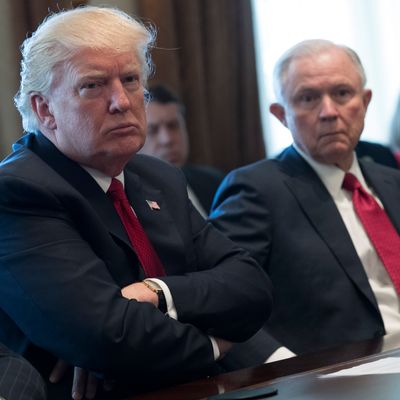
Very early into the Trump presidency, Attorney General Jeff Sessions recused himself from the investigation into Russian election interference and the Trump campaign. The recusal was not, by ordinary standards, a remotely close call. Government officials don’t conduct or oversee investigations that might implicate themselves. Sessions was not only involved in the Trump campaign, he also lied to Congress about his dealings with Russians.
Trump has repeatedly expressed his resentment at Sessions. The New York Times reports that, following the recusal, Trump asked Sessions to un-recuse himself, and berated him for refusing to do so. Trump has reportedly told people he wants a loyalist overseeing the investigation, and “argued that Eric H. Holder Jr., President Barack Obama’s first attorney general, would never have recused himself from a case that threatened to tarnish Mr. Obama.” While they can be powerful evidence on Fox News, imaginary Obama crimes are not actually binding legal precedent.
Special Counsel Robert Mueller is investigating Trump’s demands that Sessions overturn his recusal, which fits the pattern of Trump attempting to impede the investigation — or “obstruct” “justice,” if you will. Whatever the legal consequences, his demands that Sessions take the extraordinary step of reversing a recusal that was obviously needed show how deeply Trump believes the law does not apply to him.






























